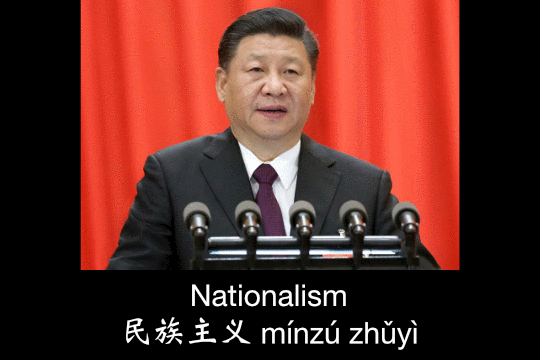Xi talks tough on Taiwan at close of China’s Two Sessions political gathering


After a dramatic oath-swearing ceremony in the Great Hall of the People yesterday, Xi Jinping closed out the 16-day Two Sessions political gathering and kicked off his second of likely many terms as China’s leader today with a sweeping nationalistic speech. Click here to watch it, or read the transcript in Chinese.
In many ways, this speech was a 40-minute version of the three-and-a-half-hour marathon address that Xi opened the 19th Party Congress with last fall. The slogans of “China dream” and “rejuvenation of the Chinese nation” each featured prominently, while a solemn insistence on the leadership of the Communist Party and the importance of a strong military — and the pursuit of increased global influence — was matched with lofty goals on policy ranging from poverty alleviation to environmental cleanup.
References to Taiwan in especially hardline language caught observers’ attention in this speech, as Reuters reports:
- “Any actions and tricks to split China are doomed to failure and will meet with the people’s condemnation and the punishment of history,” Xi declared.
- “It is a shared aspiration of all Chinese people and in their basic interests to safeguard China’s sovereignty and territorial integrity and realize China’s complete reunification,” he went on to argue.
- Some media outlets, like the Guardian, seized on an additional reference to fighting “bloody battles” as a more militaristic threat from Xi to Taiwan, but Bill Bishop of Sinocism notes (paywall) that this appears to be a translation error: The two such references were in the past tense, not the future.
- But the message is still clear: “This is an official warning from China’s top leader to the U.S. and Taiwan” that “China will never compromise on Taiwan-related issues,” Wang Jiangyu, an international law professor at the National University of Singapore, explained to Bloomberg.
The tough talk on Taiwan was likely in response to recent developments both on the island and in the United States:
- Two ex-presidents of Taiwan recently came together to call for a non-binding referendum on independence in April 2019, we reported last month. In the same report we noted how Taiwan had verbally rebuked a package of economic incentives from the mainland to attract Taiwanese investment.
- Since then, the government of Taiwan announced what it called the “Strengthen Taiwan Policies” intended to formally counteract Beijing’s measures, according to the Taipei Times.
- Donald Trump signed the Taiwan Travel Act, which is only the second official piece of American legislation on U.S.-Taiwan relations since the two parties severed diplomatic ties in 1972. (Beijing already expressed that it was “strongly dissatisfied” with this move.)
- A high-ranking American diplomat is currently visiting Taiwan, the South China Morning Post reports, making “swift use” of the new legislation. Alex Wong, deputy assistant secretary of state in the East Asian and Pacific Affairs Bureau, will visit Taipei from March 20-22 to speak at an American Chamber of Commerce event and hold discussions with local officials.
Does all this add up to an oncoming clash between Beijing and Taiwan? That’s certainly what some experts are speculating.
- “Xi seems determined to bring Taiwan under Beijing’s control during his time in office, something that would place him in the history books alongside Mao Zedong,” Willy Lam of the Chinese University in Hong Kong told the Associated Press.
- “Xi Jinping needs to deliver something big, and Taiwan is something very, very big,” opined Ding Xueliang, who studies Chinese politics and is a professor at Hong Kong University of Science and Technology. He explained (paywall) his view of Xi Jinping’s position to the New York Times: “Now you have almost all the power in your hands, and you have all the trusted people on your team, you need to deliver miracles.”
For perspective on this, I recently asked (on a The China Project Access guest chat) Michael Szonyi, Director of the Fairbank Center for Chinese Studies at Harvard University, if he thought that the likelihood of China using military force to take Taiwan had increased significantly with Xi’s extension of power. His remarks, reprinted with permission, were the following:
- “I think the real issue is 1. the degree to which Xi identified territorial unification with the China dream and 2. Xi’s setting of a deadline for the fulfillment of the dream (2049)” [note: Xi’s speech today saw a pretty clear identification of territorial unification with the China dream; read more here about the year 2049 deadline.]
- “An unsuccessful military bid for reunification would be the end of CCP rule. It would be over. So that means that Xi will have to be told by the PLA that ‘we can’t lose’ – I think this pushes the timeline out a bit.”
- “Really, isn’t that the mark of a great leader – someone who can solve a seemingly intractable problem.”
- “If he moves the goalposts such that economic integration is deemed acceptable on one side of the Strait and adequate on the other, then boom – that’s the Nobel Prize.”
In sum: It makes sense that Xi has in mind a dramatic ramping up of pressure on Taiwan during his time as leader of the Communist Party of China. But he is also likely in no rush, as his time in office is now indefinite, and as the risks of coercive action remain too high and the goal of “peaceful reunification” remains the official priority.






